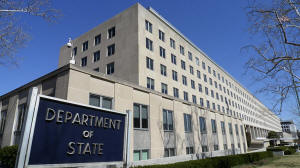Scholars stranded in America and abroad amid funding freeze of State
Department programs
[March 10, 2025]
By OLIVIA DIAZ and HEATHER HOLLINGSWORTH
Fulbright scholar Aubrey Lay was supposed to get paid for three months
of work by the U.S. government through his teaching assistantship at a
school for Ukrainian refugees in Estonia. Instead, he only got about one
week's pay and no word on when he might see the rest of his grant.
Lay is among scholars around the world who depend on State Department
funding to participate in long-established programs like Fulbright and
say their payments were abruptly cut off after being notified that
officials were reviewing their activities. The move appears to be in
line with the White House’s initiative to sharply slash government
spending, a shakeup that has affected scores of federal agencies.
The government faces even more dramatic changes in the coming weeks and
months. President Donald Trump has directed agencies to prepare plans
for widespread layoffs, known as reductions in force, that likely will
require more limited operations at agencies providing critical services.
The funding freeze has sparked panic among thousands of scholars who
area stranded outside their home countries without clarity on the future
of their programs or the money needed to support themselves.
In February, the U.S. State Department temporarily paused spending in an
effort to review its programs and activities, according to NAFSA, an
association of international educators. That included programs such as
Fulbright, Gilman and Critical Language international scholarships.
In the weeks since officials enacted the pause, some scholars and
advocacy groups have said the flow of funds dried up for people's
grants, yet there is no communication from U.S. officials on whether
that will change.

The State Department did not immediately respond to an inquiry by The
Associated Press about the funding freeze.
Lay found the lack of communication from U.S. officials troublesome. He
was also left wondering about the future of the program that his
grandmother also participated in decades ago. After it was established
in 1946, the program has become a flagship for the U.S. government’s
mission toward cross-cultural engagement. Worst for him is what it will
mean for his students, particularly if he is forced to leave early.
“I don’t want to be one more thing that is changing and uncertain in
their lives,” Lay said. “I can’t bear that thought."
Lay said he will be OK for another month, but he worries about
participants with no extra money saved.
“The clarity that I’ve gotten is that nobody knows what’s going on?" he
said. “The clarity that I’ve gotten is that every time I’ve asked
anybody, they don’t know what’s happening, and they are just as confused
as I am, as we all are.”
[to top of second column]
|

In this March 9, 2009 file photo, The Harry S. Truman Building,
headquarters for the State Department, is seen in Washington. (AP
Photo/J. Scott Applewhite, File)

Thousands of scholars are in similar positions to Lay, according to
the Fulbright Association, which is a nonprofit group comprising
alumni. In a newsletter email, the association said the halt in
funding impact “over 12,500 American students, youth, and
professionals currently abroad or scheduled to participate in State
Department programs in the next six months.”
Aside from U.S. citizens, the Fulbright Association also said the
pause has cut funding for U.S. programs hosting more than 7,400
people.
Halyna Morozova, a Fulbright scholar from Kyiv teaching Ukrainian to
students at Southern Illinois University Edwardsville, said she was
at the airport Feb. 28 after what felt like a never-ending day.
Trump berated Ukrainian President Volodymyr Zelenskyy earlier that
day in an extraordinary Oval Office meeting. The future of her
country along with her family back home weighed heavily on her mind.
Then she got an email from the Institute of International Education,
commonly referred to as IIE, which administers the Fulbright
scholarship.
“IIE is currently authorized to send you a partial stipend
equivalent to one week of your anticipated upcoming stipend
payment,” the email said. “We will update you on future payments as
soon as possible.”
Morozova panicked. She usually gets $750 each month. Now, she has to
stretch $187.50 to make ends meet.
“It was very scary, I would say, not just because I am lost in
another country,” she said. “We don't know if we will ever get
another stipend here, and if they have enough money to buy our
tickets home. So there are a lot of things that are not clear and
not certain.”
Olga Bezhanova, a professor who manages Morozova and two other
scholars, said the exchange program has been in place for nearly two
decades at her university, becoming a bedrock of their language
education. Now, she is trying to see if her university will
supplement the funds being withheld by the federal government. If
that doesn't work out, she said she was unsure of what else could be
done.
“I have to look into the faces of these wonderful people, and
they’re asking me: ‘Is this America? What is this?’” she said. “This
is a mess.”
All contents © copyright 2025 Associated Press. All rights reserved |